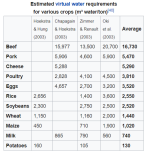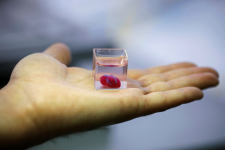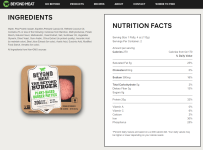I went into aldi yesterday and seen 10+ leg of lambs with £25 price tags on them. Why stock that much meat at such a high price i doubt they'd shift all those before it goes out of date. Even the smaller portions id say there was too many . Many i underestimate lamb intake but just seems like so much will be wasted
You are using an out of date browser. It may not display this or other websites correctly.
You should upgrade or use an alternative browser.
You should upgrade or use an alternative browser.
Plant based burgers and lab grown meat
- Thread starter UberTiger
- Start date
More options
Thread starter's postsI disagree.
Some meat farming is; some meat farming isn't. There are many places on Earth where human-edible vegetation does not grow but vegetation that is animal-edible does. So we use the animals to turn that vegetation into human-edible meat.
That's interesting, and that that makes sense in those cases, but it still seems to be an issue. I'm woudn't say I'm very well versed in the subject, but I've definitely seen multiple articles over the last couple of years highlighting the various types of pollution and environmental impact of different types of meat farming, beef in particular. Whether it's methane pollution or high water and energy usage as a result of that type of farming.
Wikipedia said:The 2006 report Livestock's Long Shadow, released by the Food and Agriculture Organization (FAO) of the United Nations, states that "the livestock sector is a major stressor on many ecosystems and on the planet as a whole. Globally it is one of the largest sources of greenhouse gases(GHG) and one of the leading causal factors in the loss of biodiversity, while in developed and emerging countries it is perhaps the leading source of water pollution."[1] (In this and much other FAO usage, but not always elsewhere, poultry are included as "livestock".)
A 2017 study published in the journal Carbon Balance and Management found animal agriculture's global methane emissions are 11% higher than previous estimates based on data from the Intergovernmental Panel on Climate Change.[2] Some fraction of these effects is assignable to non-meat components of the livestock sector such as the wool, egg and dairy industries, and to the livestock used for tillage. Livestock have been estimated to provide power for tillage of as much as half of the world's cropland.[3]
According to production data compiled by the FAO, 74 percent of global livestock product tonnage in 2011 was accounted for by non-meat products such as wool, eggs and milk.[4][not in citation given] Meat is also considered one of the prime factors contributing to the current sixth mass extinction.[5][6][7][8] A July 2018 study in Science asserts that meat consumption will increase as the result of human population growth and rising individual incomes, which will increase carbon emissions and further reduce biodiversity.[9]
In November 2017, 15,364 world scientists signed a Warning to Humanity calling for, among other things, drastically diminishing our per capita consumption of meat.[10] A similar shift to meat-free diets appears also as the only safe option to feed a growing population without further deforestation, and for different yields scenarios.[11]

https://en.wikipedia.org/wiki/Environmental_impact_of_meat_production
If it taste good and not more expensive I’d eat it just the same as any other beef burger. A good burger is a good burger.
It was the exact same price as their cheapest standard burger and chips, with alternative fancy burgers being a pound or two more.
The issue you seek is overgrazing, and it is a significant issue in places like the Sahara where it contributes to desertification. But you also need to look at places like the South Downs where you have a thin layer of grass over chalk, and you can't grow crops on that but you can graze sheep, which produce wool, milk, meat, horn, and leather. Similarly there are pastures which are unsuitable for food crops but are suitable for grazing cattle, which produce milk, meat, leather, and horn. Most farmers I know don't stand on ceremony: they'll produce the most profitable crops!
Israeli researchers have just created the worlds first 3D printed heart from human cells. Maybe eventually they'll be able to 3D print real beef meat from bovine cells! 
https://www.nbcnews.com/mach/scienc...rld-s-first-3d-printed-heart-using-ncna996031


https://www.nbcnews.com/mach/scienc...rld-s-first-3d-printed-heart-using-ncna996031

Soldato
I went into aldi yesterday and seen 10+ leg of lambs with £25 price tags on them. Why stock that much meat at such a high price i doubt they'd shift all those before it goes out of date. Even the smaller portions id say there was too many . Many i underestimate lamb intake but just seems like so much will be wasted
Aldi are the cheapest per kilo for legs of lamb this Easter and the fastest growing supermarket, they also attract all levels of consumer so will sell them easily - if not they aggressively reduce until they do, 50% off but they don’t seem to ever have many left if you follow the tracker places/groups for deals!
£25 is very cheap for a leg of lamb that size and as supermarket meat goes its generally on the better side.
Soldato
The issue you seek is overgrazing, and it is a significant issue in places like the Sahara where it contributes to desertification. But you also need to look at places like the South Downs where you have a thin layer of grass over chalk, and you can't grow crops on that but you can graze sheep, which produce wool, milk, meat, horn, and leather. Similarly there are pastures which are unsuitable for food crops but are suitable for grazing cattle, which produce milk, meat, leather, and horn. Most farmers I know don't stand on ceremony: they'll produce the most profitable crops!
The issue being of course we don’t need any of those things produced by the animals and the ‘cost’ to produce them is still very high - we are conditioned into thinking we need milk for example, we don’t etc etc.
The same goes for various crops, we produce so much stuff poorly because it becomes fashionable and then farmers grow it where they can rather than where they should!
Soldato
The issue being of course we don’t need any of those things produced by the animals and the ‘cost’ to produce them is still very high - we are conditioned into thinking we need milk for example, we don’t etc etc.
The same goes for various crops, we produce so much stuff poorly because it becomes fashionable and then farmers grow it where they can rather than where they should!
bold statement you have there!
try going through life without consuming any animal products and see how you get on..
Aldi are the cheapest per kilo for legs of lamb this Easter and the fastest growing supermarket, they also attract all levels of consumer so will sell them easily - if not they aggressively reduce until they do, 50% off but they don’t seem to ever have many left if you follow the tracker places/groups for deals!
£25 is very cheap for a leg of lamb that size and as supermarket meat goes its generally on the better side.
Fair enough as long as it gets eaten. Lamb is my favorite meat but being Yorkshire I've heard the stories from farmers of how "annoying" it is to listen to the sheep sounds the days after they take their lamb away. Never phased me enough to stop eating lamb but I hate any wasted meat knowing that it lost it's life to be thrown in the bin.
Hehe, I choose vegetarian food over meat more often than not - well over half my meals are meat free and probably lots more but I still eat meat.... I have chosen to cut down my meat intake and don’t really have any processed meat at all - even sausages as Cauldron do great meat free ones!
Bacon is an issue.... I’ve not had it for a while but never bother with veggie stuff!!
Fry’s Meat free traditional sausages are the closest tasting to “real” sausages that I’ve tried.
As for bacon the Quorn stuff is poor and if I remember correctly it has dairy in it.The Cheatin Bites bacon is ok,it’s a really mild taste though so I usually stick a slice on top of a beyond burger.
Soldato
Fry’s Meat free traditional sausages are the closest tasting to “real” sausages that I’ve tried.
As for bacon the Quorn stuff is poor and if I remember correctly it has dairy in it.The Cheatin Bites bacon is ok,it’s a really mild taste though so I usually stick a slice on top of a beyond burger.
I’ve heard Fry’s make really good mince and sausages but never seen it in the wild!
Soldato
- Joined
- 14 Aug 2018
- Posts
- 3,393
Thanks for the info, it looks like they're sold at Morrison's so will take a trip down tomorrow and see how the missus likes them.Fry’s Meat free traditional sausages are the closest tasting to “real” sausages that I’ve tried.

The issue being of course we don’t need any of those things produced by the animals and the ‘cost’ to produce them is still very high - we are conditioned into thinking we need milk for example, we don’t etc etc.
The same goes for various crops, we produce so much stuff poorly because it becomes fashionable and then farmers grow it where they can rather than where they should!
This x10000. yes indeed yhere is land where you cant grow crops but can graze animals. But that doesn't magically make the environmental impact go away.
Moreover, those animals still end up needing foodstuffs produced on more fertile land that can be used for human crops.
Moreover, those animals still end up needing foodstuffs produced on more fertile land that can be used for human crops.
That's not correct. Sheep survive just fine on the South Downs, for instance.
That's not correct. Sheep survive just fine on the South Downs, for instance.
When supplemented with hay in winter.
But my point is a more generic one regarding meat. If you look at the table above, bef has a huge water requirement, and a huge emissions cost as well. The typcial scenario is cattle reared in semi-arid grass lands that are not suitable for arable crops. However, Foodstock from maize or corn is used to fatten up the cows and those crops could be used to feed humans instead. Around 70% of all crops grown are used to feed animals, which is a wholly inefficient use. It is much better if humans consume the crops directly. therefor,e you don;t have to make use of the vast areas of arid grassland to raise cattle in the first place.
Just like we don't actually need sheep for anything critical so even if Sheep are entirely self-sufficient within a certain environment and nothing else can be be grown there then it is still a massive net negative to have those animals in the first place.
Then you have the fact that most parts of the UK that are sheep farmland would naturally be forested up to a height of about 2500ft in sheltered locations.A large reforestation project would serve as a good carbon capture and would have beneficial effects to local air and water quality
But my point is a more generic one regarding meat. If you look at the table above, bef has a huge water requirement,
I'm very suspicious of that figure. And I wonder if they're including milking cows. Theoretically cattle should be very efficient - just look at bison in America and wildebeest in Africa.
Just like we don't actually need sheep for anything critical
Wool, milk, leather, clothing.
Then you have the fact that most parts of the UK that are sheep farmland would naturally be forested up to a height of about 2500ft in sheltered locations.A large reforestation project would serve as a good carbon capture and would have beneficial effects to local air and water quality
Yup, you try growing trees on the South Downs. Or Exmoor. Or other moorland.
Caporegime
- Joined
- 21 Jun 2006
- Posts
- 38,372
do we even know the ingredients in these burgers?
chances are they are full of unhealthy crap anyways..
yes we do as they have to be provided by both the manufacturer and the chain restaurants that sell them.
so maybe next time it would be best not to spread rubbish info and do a quick google?
the ingredients are healthy in the plant based ones because you know they are plant based. lab grown meat is 100% processed and also doesn't taste anywhere near as good however is cheaper.
fry's burgers are the best, quorn is cheap crap.
the beyond meat burgers are really good but expensive.
this stuff is really good
https://www.waitrose.com/ecom/products/vivera-veggie-shawarma-kebab/472425-629172-629173
however i add my own fresh spices to their already spiced meat to make it full of flavour. this is the issue with meat as well. all meat which is healthy tastes bland unless burnt on a charcoal grill. the unhealthier the meat the more flavour it has. which is why bacon and sausages taste good but a plain chicken breast doesn't. it's the spices which make healthy meat taste good. so you can add those same spices to plant based alternatives too.
Last edited:
Soldato
ha love this 'the ingredients are healthy in the plant based ones because you know they are plant based'
it's still gonna be processed garbage..
even those kebabs you linked with it's glyphosate enriched soya has rapeseed oil in them.
it's still gonna be processed garbage..
even those kebabs you linked with it's glyphosate enriched soya has rapeseed oil in them.
do we even know the ingredients in these burgers?
Impossible Foods - https://impossiblefoods.com
For the Impossible Burger it seems this is made by taking the DNA from Soy, combining it with yeast and fermenting to make heme (from hemoglobin, the protein in red blood cells that carries oxygen), which is part of what makes meat taste good.
https://impossiblefoods.com/heme
The reciped changed this year for the Impossible Burger for V2.0
The Impossible Burger is the brainchild of Stanford biochemist and genomics expert Pat Brown, PhD, MD, who has described industrialized meat production as "the most destructive technology on Earth."
At Impossible Foods, the key components of meat have been identified, characterized and sourced from plants such as soy and potatoes, and processed using high-moisture extrusion and other techniques in order to meet precise functional, taste and textural criteria.
Impossible Burger OLD ingredients list: water, textured wheat protein, coconut oil, potato protein, natural flavors, 2% or less of: leghemoglobin (soy), yeast extract, salt, soy protein isolate, konjac gum, xanthan gum, thiamin (Vitamin B1), zinc, niacin, vitamin B6, riboflavin (Vitamin B2), vitamin B12.
Impossible Burger NEW ingredients list: Water, soy protein concentrate, coconut oil, sunflower oil, natural flavors, 2% or less of: potato protein, methylcellulose, yeast extract, cultured dextrose, food starch modified, soy leghemoglobin, salt, soy protein isolate, mixed tocopherols (vitamin E), zinc gluconate, thiamine hydrochloride (vitamin B1), sodium ascorbate (vitamin C), niacin, pyridoxine hydrochloride (vitamin B6), riboflavin (vitamin B2), vitamin B12.
The new version“has as much bioavailable iron and high-quality protein as a comparable serving of ground beef from cows,” says the company. “In addition, it has no cholesterol, 14g total fat and 240 calories in a quarter-pound patty (a quarter-pound beefburger has 80mg cholesterol, 23g total fat and 290 calories).”
https://www.foodnavigator-usa.com/A...centrate-in-its-plant-based-Impossible-burger
Beyond Burger - https://www.beyondmeat.com

https://www.beyondmeat.com/products/the-beyond-burger/
if you ffwd through supermarkets secrets, last night tv, they visited beyond burger in California, and showed ingredients, and discussed product strategy,
the addition/processing of many nice ingredients, which are tasty in their own right to produce imitation meat,
I felt people should just expand their culinary knowledge to appreciate those ingredients eg. beetroot..... the unspecified beef taste ingredient - um.
corollary ? - whats the environmental impact of that processing.
the addition/processing of many nice ingredients, which are tasty in their own right to produce imitation meat,
I felt people should just expand their culinary knowledge to appreciate those ingredients eg. beetroot..... the unspecified beef taste ingredient - um.
corollary ? - whats the environmental impact of that processing.

